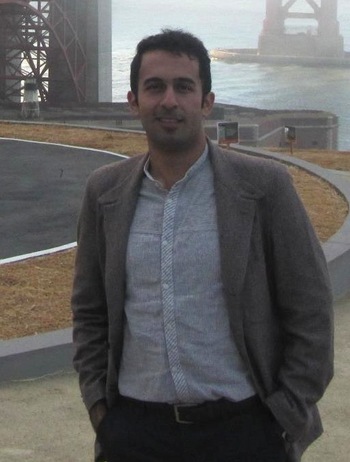Iranian student overcame obstacles to vote
While millions of Iranians braved long lines and waiting periods to vote in their presidential election this summer, one Iranian student studying abroad at UW–Madison faced a set of different challenges.

Amir Yazdanbakhsh, who has traveled the U.S. since arriving at UW–Madison, poses near the Golden Gate Bridge in San Francisco.
Amir Yazdanbakhsh, a second year UW–Madison computer science research assistant pursuing a Ph.D., cast his absentee ballot in Washington, D.C., where he currently interns at the Arlington branch of the University of Southern California’s Information Sciences Institution.
Since Iran lacks an embassy in the U.S., Iranian officials operated only 20 polling locations across the country June 14 in large cities such as Chicago and San Francisco, according to the Iranian Interests section of Pakistan’s embassy.
To vote, Yazdanbakhsh had to present a passport to receive a ballot. Rather than marking the name of the candidate on the ballot that they support as people do in the U.S., he had to write out the candidate’s full name.
Yazdanbakhsh says that people in Iran seem to be more eager and engaged to vote than people in the U.S., citing that more than 70 percent of the population turned out to vote.
“You can see politics affect the daily lives of people in Iran,” Yazdanbakhsh says. “You usually hear about the political issue and you have conversation with normal people in the streets. Politics plays a big role in Iranian lives.”
Since arriving on campus more than a year-and-a-half ago, Yazdanbakhsh has also noticed a few other differences between Iran and the U.S. One of the biggest differences, he says, is the emphasis Americans place on sports.
“Traveling is a way for me to meet new people, new cultures, and to learn from them. It helps me to become more experienced.”
Amir Yazdanbakhsh
“People run all the time,” Yazdanbakhsh says. “In Iran, you couldn’t see people running in the streets, but here people really care about their health and they play sports a lot. It was a rather shocking thing for me.”
Yazdanbakhsh, an avid traveler, has visited Turkey and Greece. Since he arrived in fall of 2011, he has visited Florida, New York, California, Texas and Massachusetts. He says that one of the places he liked best was Austin, Texas because it was a lively college town with live music throughout the city.
To enhance his travels, Yazdanbakhsh also participates in Couchsurfing, a website focused on connecting people interested in traveling. The 6 million member website allows people to offer their couches, spare rooms or air mattresses to strangers.
Yazdanbakhsh says the site not only allows him to travel cheaply but also to meet people from throughout the world. He says he has offered his couch to people visiting Madison who have travelled from Germany, Mexico, England and Italy.
“Traveling is a way for me to meet new people, new cultures, and to learn from them,” Yazdanbakhsh says. “It helps me to become more experienced.”
He says he chose to attend UW–Madison because of the strength of its academics and its college life.
Yazdanbakhsh is in the process of switching from studying computer engineering to studying computer architecture, planning to become a faculty member at a university once he finishes his Ph.D.
—Sean Kirkby



